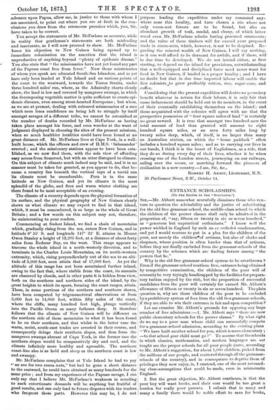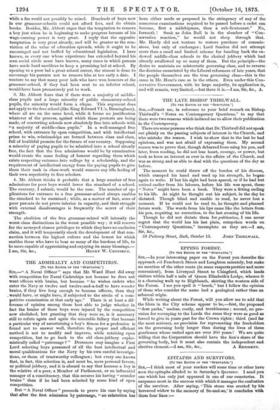ENTRANCE SCHOLARSHIPS.
[TO TER EDITOR Op TDB " EPECTA.TOR:1
SIR,-Mr. Abbott somewhat scornfully dismisses those who ven- ture to question the advisability and the justice of substituting for the old free grammar-school, the middle-class school in which the children of the poorer classes shall only be admitted in the proportion of, "say, fifteen or twenty in six or seven hundred," as "generous but unpractical enthusiasts." I know well the power wielded in England by such an ex cathedra condemnation, and yet I would venture to put in a plea for the children of the poor, not merely the childrenl'of artisans, but also of clerks and shopmen, whose position is often harder than that of artisans, before they are finally excluded from the grammar-schools of the country by the schemes which are finding favour among " the powers that be."
Why is the old free grammar-school system to be overthrown ? Even if the grammar-school continue free, entrance being obtained by competitive examination, the children of the poor will of necessitybe very tryingly handicapped by the facilities for prepara- tory tuition enjoyed by the rich, but the proportion of successful candidates from the poor will certainly far exceed Mr. Abbott's allowance of fifteen or twenty in six or seven hundred. The plain question is, why are these children of the poor to be excluded bya prohibitory system of fees from the old free grammar-schools, if they are able to win their entrance in fair and open competition?
Let me examine Mr. Abbott's grounds for opposing any large number of free admissions :-1. Mr. Abbott says " there are now public elementary schools for the poorer classes." By what right do we say to a poor man whose child can successfully compete for a grammar-school admission, according to the existing plans " We have built another school for you, which is more elementary ; —to that school your child must go ?" To assume that the schools in which classics, mathematics, and modern languages are not taught are the proper schools for all poor people (save, according to Mr. Abbott's suggestion, for about 1,000 children, picked from the millions of our people, and scattered through all the grammar- schools of the country), and in consequence to deprive them of privileges they now enjoy, is, I contend, one of the most astound- ing class-assumptions that could be made, even in aristocratic England.
2. But the great objection, Mr. Abbott continues, is that the poor boy will want books, and their cost would be too great a burden for really poor parents. I submit that in many and many a family there would be noble effort to save for books,
while a fee could not possibly be raised. Hundreds of boys now in our grammar-schools could not afford fees, and do obtain books. Besides, Mr. Abbott urges that the temptation to remove a boy just when he is beginning to make progress because of his wage-earning power is very great. I reply that the opposite temptation is very great already, and will be greater as the con- viction of the value of education spreads, while it ought to be encouraged and not baffled by educational legislation. I have known, as every one whose experience has extended beyond his own social circle must have known, many cases in which parents have made hard sacrifices to keep a promising lad at school. By opening to a poor lad a great school career, the utmost is done to encourage his parents not to remove him at too early a date. I venture to say that many poor lads who have won honours at the grammar-school, if they had been sent to an inferior school, would have been prematurely put to work.
3. Mr. Abbott fears that if there were a majority of middle- class pupils and a large minority of public elementary-school pupils, the minority would form a clique. This argument does not apply to the free school (like King Edward VI.'s, Birmingham), where all are on the same level, while it forms no justification whatever of the process, against which these protests are being made, of converting schools now absolutely free into schools with "a majority of middle-class pupils." In a well-managed free school, with entrance by open competition, and with intellectual prizes to win, relationships are formed between class and class, full of healthful promise for the future of our country. Supposing a minority of paying pupils to be admitted into a school already free, the fact that the free admissions would be by examination would create the same feeling of honour regarding them which exists respecting entrance into college by a scholarship, and the requirement of intellectual energy from the paying pupils to give them their rank in class-work would remove any idle feeling of their own superiority to free scholars.
4. Mr. Abbott thinks it probable that a large number of free admissions for poor boys would lower the standard of a school. The contrary, I submit, would be the case. The number of ap- plications for entrance to a free grammar-school always enables the standard to be sustained ; while, as a matter of fact, sons of poor parents do not prove inferior in capacity, and their struggle with external disadvantages is frequently the secret of their strength.
The abolition of the free grammar-school will intensify the worst class distinctions in the worst possible way ; it will reserve for the moneyed classes privileges to which they have no exclusive claim, and it will temporarily check the development of that con- nection between the highest culture and the lowest lot which enables those who have to bear so many of the burdens of life, to be more capable of appreciating and enjoying its many blessings.—



































 Previous page
Previous page